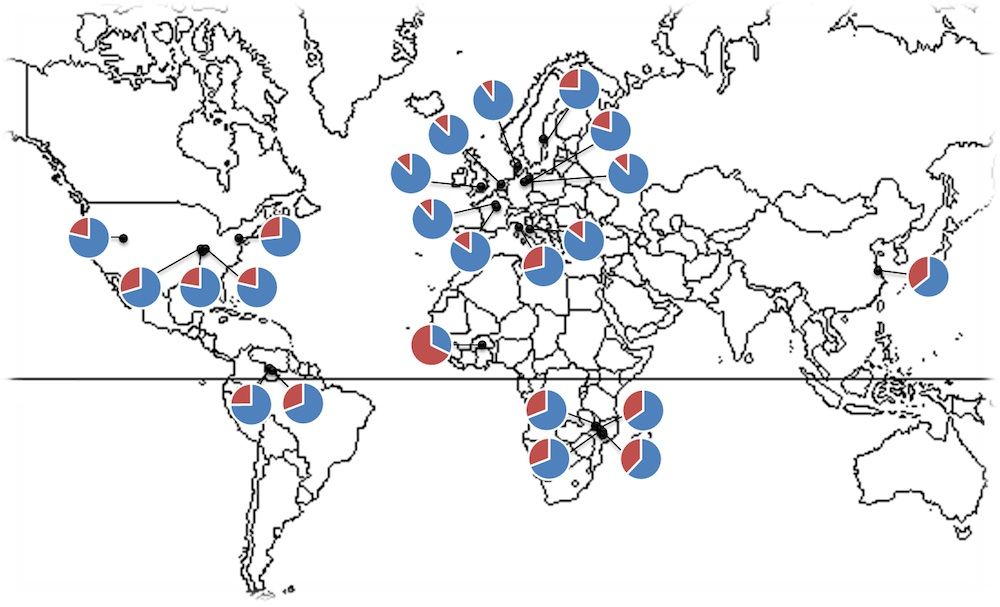
People who live in colder climates tend to have more of the gut microbes associated with obesity, a new study suggests.
Researchers found that people living farther north, in generally colder locales, have more of the bacterial group Firmicutes and fewer of the group Bacteriodes within their guts.
Previous research has shown that people with more Firmicutes bacteria tended to be heavier, while people with leaner bodies had more Bacteriodes. (The new study didn't have information on subjects' body mass indexes, and so couldn't directly tie the bacterial gut composition with obesity.)
Still, the new findings support the hypothesis that certain obesity-associated microbial communities are "too good at digesting food," meaning they break food down in a way that leaves more calories available for a person's body to use, said study co-author Taichi Suzuki, a doctoral candidate in integrative biology at the University of California, Berkeley.
However, the study found an association, not a causal relationship, between gut bacteria and geography. As a result, it's hard to say whether genetic differences, dietary changes or some other mechanism is at play, Suzuki told Live Science.
Colder and heavier
Past work had suggested that people have adapted to colder climates by packing on extra pounds that act as insulation, Suzuki said. For instance, some studies have found that Inuits tend to be heavier than African tribesmen, he said.
Sign up for the Live Science daily newsletter now
Get the world’s most fascinating discoveries delivered straight to your inbox.
But the relationship between cold and weight isn't clear-cut. For instance, spending time in the cold increases caloric expenditure. And other studies show that shivering triggers similar muscle responses as exercise. [11 Surprising Things That Can Make Us Gain Weight]
Suzuki and his colleagues looked at studies that described the gut microbes of 1,020 people from 23 populations around the world, from Sweden to Malawi.
Their finding of differences in gut bacteria doesn't appear only in humans. At the Society for the Study of Evolution conference last year, Suzuki also showed that mice captured in northern parts of the United States tend to be heavier than their Floridian counterparts, and also tend to have obesity-linked microbes.
Cause or effect?
It's not clear whether the difference in gut microbes is a cause or consequence of the colder climate.
One possibility is that people in colder climates have some genetic adaptations that help the obesity-linked microbes thrive, Suzuki said.
But there is a lot of variability in microbes, even among people living in the same regions. And in the United States, obesity rates don't seem to correlate with latitude, as many of the slimmest states are some of the farthest North.
So it's also possible that people farther north tend to eat the high-fat, low-fiber foods that fuel the growth of Firmicutes at the expense of Bacteriodes, Suzuki said.
"My 'gut feeling' is that the latitude trend reflects differences in dietary intake that in turn affects the structure of the microbiome," said Seth Bordenstein, a biologist at Vanderbilt University in Nashville, Tenn., who was not involved in the study.
The study was detailed today (Feb. 11) in the journal Biology Letters.
Follow Tia Ghose on Twitter and Google+. Follow Live Science @livescience, Facebook & Google+. Original article on Live Science.

Tia is the managing editor and was previously a senior writer for Live Science. Her work has appeared in Scientific American, Wired.com and other outlets. She holds a master's degree in bioengineering from the University of Washington, a graduate certificate in science writing from UC Santa Cruz and a bachelor's degree in mechanical engineering from the University of Texas at Austin. Tia was part of a team at the Milwaukee Journal Sentinel that published the Empty Cradles series on preterm births, which won multiple awards, including the 2012 Casey Medal for Meritorious Journalism.










